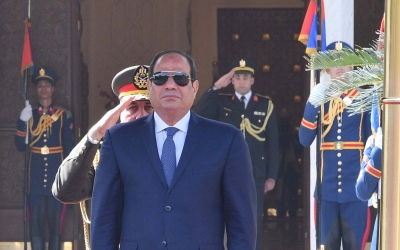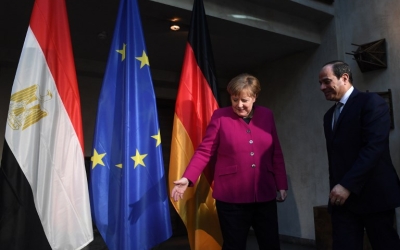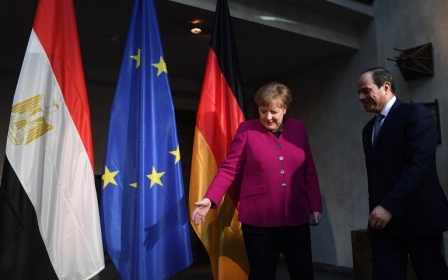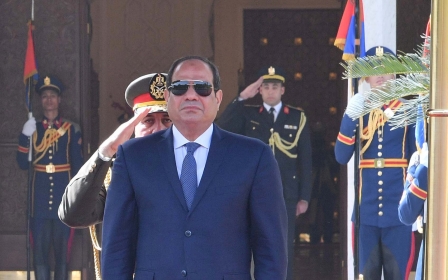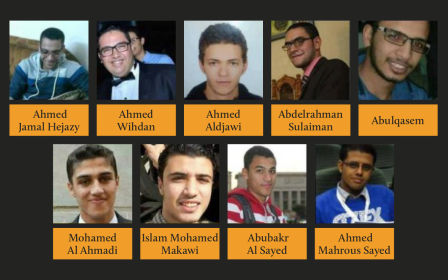EXCLUSIVE: EU in talks with Egypt and other states over police data-sharing

European Union officials have begun talks with counterparts in several Middle Eastern countries, including Egypt and Turkey, about proposed data-sharing deals that would allow Europol to exchange personal information about suspects with local law enforcement authorities.
In some circumstances, the deals could allow the transfer of data concerning a person’s race and ethnic origin, their political opinions and religious beliefs, trade-union memberships, genetic data and data concerning their health and sex life.
The deals are being sought by the EU as part of efforts to bolster counter-terrorism policing across the continent despite concerns being raised about the human rights records of the countries by the bloc’s own data protection watchdog.
Since the start of the year, Egypt has executed a number of prisoners convicted in cases in which several said they had been tortured into false confessions.
Hundreds more people have also been sentenced to death, in what anti-death penalty campaign group Reprieve has called a “full-blown human rights crisis”, since President Abdel Fattah el-Sisi seized power in a coup in 2013.
The other countries with which the EU is seeking data-sharing deals are Israel, Algeria, Jordan, Lebanon, Morocco, Tunisia and Turkey.
A spokesperson for the European Commission, the EU’s governing body which is leading the talks, told Middle East Eye that negotiators had held a first-round of talks with Turkey in Brussels in November last year.
The spokesperson said the Commission had also held a meeting with representatives from Algeria, Egypt, Jordan, Lebanon, Morocco and Tunisia on 3 December “to discuss opportunities for cooperation between Europol [the EU's law enforcement agency] and those countries’ law enforcement”.
Maya Foa, the director of Reprieve, told MEE it was “extremely concerning that the EU is seeking closer ties with Egyptian security agencies which have been implicated in wide-scale abuses, including torture and hundreds of death sentences in mass trials.
“The EU should call on Sisi to bring an end to the horrific human rights violations that have led to these mass death sentences, and ensure that any data sharing does not lead to EU complicity in Egypt's brutal death penalty regime."
Leslie Piquemal, Senior EU Advocacy Representative at the Cairo Institute of Human Rights, told MEE: “This is an extremely worrying development. Several European states already cooperate with Egypt bilaterally in this manner, to various extents.
“The EU move to do the same will lead to further normalisation of cooperation with Egyptian security bodies known for systematic rights violations.
"These violations have also repeatedly been used as means of extracting confessions from persons incriminated in 'terrorism' cases, and who are then subjected to unfair trials which can lead to long prison sentences or the death penalty.”
Countries 'in breach of fundamental rights'
The Commission called for data-sharing arrangements to be agreed with the eight countries as part of a package of counter-terrorism measures unveiled in October 2017.
Both the European Council, which is made up of the leaders of the 28-state bloc, and the European Parliament have approved the negotiations, despite the latter also raising concerns about Egypt's human rights record in a resolution last year.
Both bodies stress that any final agreements must be conditional on the countries bringing their own data protection laws in line with EU standards, and the implementation of safeguards to ensure that human rights are respected.
The parliament’s civil liberties committee says that a thorough impact assessment is still needed to evaluate the risks posed by the proposed deals, and the parliament will have to give its consent before any final agreements are signed.
In an opinion paper published last year, the European Data Protection Service also said that additional safeguards and guarantees were needed to ensure that data transfers did not breach human rights commitments.
It also recommended that any agreement should include guarantees that data transfers from Europol would not be used in cases leading to a death sentence, noting that only Israel among the eight countries had abolished the death penalty.
“The EDPS notes that some of the third countries for which cooperation with Europol is envisaged have been found in breach of such fundamental rights,” the paper said.
“The United Nations Committee Against Torture has pointed to grave deficiencies in some of these countries in relation to reported cases of acts of torture and ill-treatment, the conditions of places of detention, the use of coerced evidence, the lack of basic safeguards for detainees and the living conditions in refugee camps.”
Sex life data only when 'strictly necessary'
Directives issued by the Commission to its negotiators as the basis for future data-sharing deals with each of the countries state that agreements should facilitate “mutual cooperation in preventing and combating serious transnational crime and terrorism” but also “ensure appropriate safeguards with respect to the protection of privacy, personal data and fundamental rights and freedoms of individuals”.
'It's worrying to see countries that preach democracy advocating for a dictatorship that clearly violates human rights'
- Ibrahim Halawa
But they also appear to leave open the door for the exchange of personal data relating to political and religious beliefs, and even details about a suspect’s sex life, in cases in which the sharing of such data is deemed “necessary and proportionate”.
“The transfer of personal data revealing racial or ethnic origin, political opinions, religious or philosophical beliefs, trade-union membership, genetic data and data concerning a person's health and sex life by Europol shall be prohibited, unless it is strictly necessary and proportionate in individual cases for preventing or combating criminal offences as referred to in the Agreement and subject to appropriate safeguards,” the directives say.
Ibrahim Halawa, an Irish citizen arrested in Egypt in 2013 aged 17 and held in prison for more than four years, told MEE that the potential sharing of data between European and Egyptian police forces was alarming.
"It is worrying to see countries that practice and preach democracy advocating for a dictatorship that clearly violates human rights and freedom of expression," said Halawa, who was arrested when security forces stormed a mosque in Cairo where anti-government protesters had sought refuge.
He was put on trial with hundreds of others on charges carrying the death penalty but was eventually acquitted.
"It's worrying for Egyptians living abroad, and for people from all of the Middle Eastern countries," said Halawa.
"They are telling people that they are not safe because we could give your data to dictators and murderers in other countries.
"If you look at what an execution is, it is not just one person taking another person's life. It also involves those who enable it to happen."
Piquemal, from the Cairo Institute of Human Rights, said that data-sharing between police forces could also further endanger activists, dissidents and exiles living in Europe.
“The data-sharing agreement could involve additional threats for human rights defenders, for peaceful activists and for any citizen trying to escape repression by the Egyptian and other MENA countries’ security forces by travelling to Europe, because it leads to making personal data available to unsympathetic law enforcement agencies who could deport them, and/or reveal their location to the Egyptian authorities,” she said.
In a resolution in December, the European Parliament expressed "serious concern at the mass trials by Egyptian courts and the large number of death sentences and long prison terms handed down".
It called on EU states to halt "exports of surveillance technology and security equipment to Egypt that can facilitate attacks on human rights defenders and civil society activists, including on social media".
And it called on the EU’s senior diplomat, Federica Mogherini, and diplomatic service to “to prioritise the situation of human rights defenders in Egypt, and to condemn the alarming human rights situation in the country, including the use of the death penalty... and to use all means of influence at its disposal to put pressure on Egypt to improve its human rights situation and halt imminent executions".
Mogherini and other European leaders and officials will be in Sharm el-Sheikh on Sunday and Monday for a summit meeting of EU and Arab League nations.
Egyptian opposition leaders on Friday wrote to Mogherini and other EU leaders to urge them to boycott the event, warning that executions were set to become a weekly event.
A Commission spokesperson told MEE that no further talks on law enforcement cooperation between EU officials and officials from the six Arab League states were planned at the summit.
Asked whether the recent executions in Egypt would affect the progress of data-sharing talks the spokesperson said: "Human rights considerations play an important role in cooperation between law enforcement, including in any negotiations which take place in that context.
"As for the recent executions, the European Union is unequivocally opposed to the use of capital punishment in all cases and under all circumstances, and has consistently called for its universal abolition."
Middle East Eye delivers independent and unrivalled coverage and analysis of the Middle East, North Africa and beyond. To learn more about republishing this content and the associated fees, please fill out this form. More about MEE can be found here.



